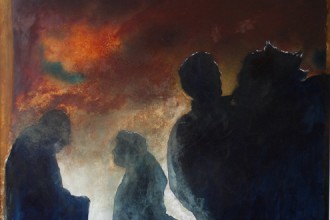Richard O’Brien on two artists unafraid to ‘lay their open hearts down’ and step forward out of the gloom…
‘and in a sense we’re all winning
we’re alive’ – Frank O’Hara, Steps
Does anyone find it easy to admit they’re happy? In real life, maybe – but in art, avowals of optimism are a rare step, and a bold one. There’s always the threat that a sentiment of contentment with the world will be received as gauche, naïve, or saccharine, and coming right out there with a declaration of your love for life is akin to laying your open heart down on the train tracks. Frank O’Hara isn’t always optimistic – but he often is, and for all the mythos of spontaneity there are consistent strategies behind those of his poems that read like lightning-rods for a pure, untrammelled joy. Few writers – even very successful writers – have been able to harness this approach creatively, and on recently reading some of O’Hara’s most buoyant work, including ‘Steps’, an odd feeling of familiarity shot through me.
 ‘oh god it’s wonderful
to get out of bed
and drink too much coffee
and smoke too many cigarettes
and love you so much’
Imagine those lines delivered over a stripped-back beat and a classic two-chord rhythm, in a voice practically tripping over itself to get to the end of the line. What you’re imagining, reader, is the breakdown in a Jonathan Richman song. When it comes to what defines the vein of optimism in their work, there are some surprising parallels between the New York poet and the New England singer-songwriter. As with comedy, the aesthetics of the upbeat have largely escaped serious theorisation. Well, make sure you’ve got your double chocolate malted to hand, because things are about to get heavy.
G K Chesterton, in a work on Chaucer, identifies the characteristics of an approach to the world he believes ‘the poets’ to best exemplify (I doubt he could have had an exhaustive list). That quality, at its height in Chaucer, is a recognition ‘of actuality, of existence, of the fact that things truly are, and that we ourselves are incredibly and sometimes almost incredulously real.’ For Chesterton, this goes beyond mere secular optimism to ‘the primeval duty of Praise’, and seeing things in ‘the light in the positive’ is a necessary adjunct to this sanctified world-worship. We don’t need to follow him so far to accept the existence of a position which begins with a ‘primary wonder at the very existence of the world’. So what follows, logically, in the case of our two examples?
It seems hard to imagine optimism without a love of what exists, in all its beauty and its heartache: an inclination to ‘always embrace things, people earth/sky stars’ which the Sun itself identifies in one of O’Hara’s best-known poems. Richman, as usual, frames this embrace of sensory stimuli as a simply-stated romantic conceit, back in 1986: ‘I wake up in the morning and I love the world/Like a boy, like a boy chasing his first girl’; twenty-five years later, ‘I love this sad world’ remains his credo. And in 1960, here’s O’Hara: ‘it’s also pretty hard to remember life’s marvellous/but there it is guttering choking then soaring’.
As a singer, Richman’s lineation is more, well, linear; but he has a similar focus on the throwaway.
His songs take place in shopping centres, bars – of both the cappucino and lesbian varieties – and thrift stores, where Richman reels off a list of cast-off and unwanted products which the song takes into its capacious heart. And they gleefully embrace the small, quotidian things that are our first point of engagement with the world, as best evidenced by this deliriously goofy video:
‘You know T-shirt, sweatshirt, cut-off shorts, you know those
Plain old everyday clothes.’
 Or this:
 ‘Well, cruddy little chewing gum wrapper,
My heart would not let go;
The colors hypnotize me, and I love them so.’
It’s another act of recuperation, which treats a discarded chewing gum wrapper the same way as the bastions of high art. Richman’s assessment of this piece of litter is no different from his take on Vincent Van Gogh, who ‘loved color and he let it show’, and Vermeer who ‘had his own color range/As if born in a more modern age.’ O’Hara, an assistant curator at the Museum of Modern Art, would probably have known at first hand whether or not Pablo Picasso frequently was called an asshole, but that didn’t stop him writing ‘we lose our health in a love/of color’ in his own ‘Ann Arbor Variations’.
‘Why I Am Not A Painter’ shows O’Hara thinking about the processes of painting, but more common is his self-reflection, his placement of himself within his poems as their giddy, almost uncomprehending maker: ‘the centre of all beauty!/writing these poems!/imagine!’ Richman, too, consistently includes within his art the process of its composition – witness every ‘Jonathan! Jonathan!’, every call for ‘Guitar!’ which brings the spontaneous showmanship of live performance into the sterile space of the recording studio. The run-on sentence and the exclamation mark signal O’Hara on the page, but neither is missing from Richman’s long titles, his semi-improvised spoken segments; what is his distinctive voice, if not a permanent exclamation mark?
These tics often appear when Richman wants to signal other loves – an unironic celebration of rock’n’roll, or praise for the civic spaces of Boston, which O’Hara more than equals with his topographical specifics and his shout-outs to the greats of jazz. So what’s at stake when a Frank O’Hara poem contains an image of Frank O’Hara writing poems, or when a Jonathan Richman song proudly announces its status as a live-recorded artefact?
 To which I’d add only this: a video of Frank O’Hara reading for the TV cameras in his New York loft, the year of his untimely death, wearing what seems to be nothing more formal than jeans and a shirt. Plain old everyday clothes.




